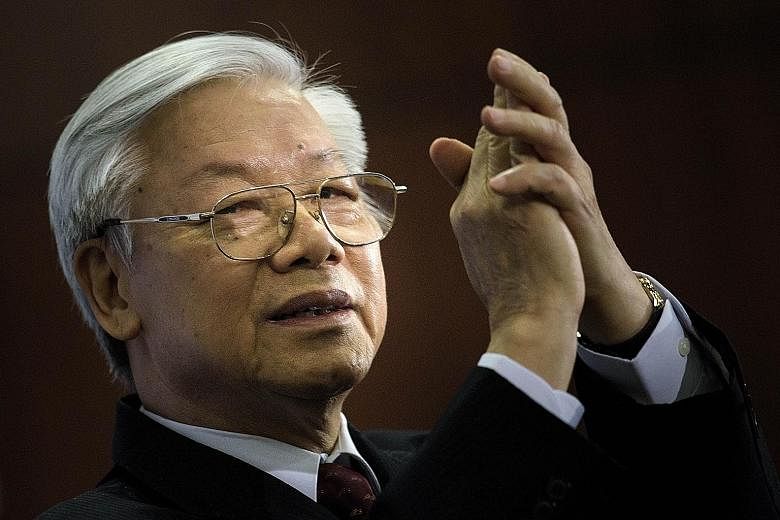It has been a long journey for Mr Nguyen Phu Trong - one that has taken him from a commune near Hanoi where he was reportedly born to poor peasants, to the top of Vietnam's Communist Party and, last week, to the White House, the political heart of his country's one-time arch- enemy.
To most ordinary Vietnamese, even as an explosion of social media use has begun lapping at the firewalls of the Communist Party, their top leaders are still relatively enigmatic. But Mr Trong is seen as a conservative and a pragmatist, balancing the country's interests between China and the United States.
The 71-year-old communist's career has been one of letters; he is an ideologue, not a warrior.
"He has a reputation for being quiet and scholarly," said Mr Fred Burke, a long-time lawyer in Vietnam who officials consult on state policy. A local folk song refers to him as rather slow and nicknames him Trong Lu, which means dumb.
Still, Mr Trong's rise has been attributed to his incorruptible image and adeptness at balancing powerful party factions.
And slow or not, he made history when he, as the general secretary of the Communist Party, met US President Barack Obama at the White House on July 7.
In 1981, after years of involvement in communist ideology and propaganda, some of it spent editing the party journal Communist Review, Mr Trong went to the Academy of Social Sciences in the then Soviet Union where he earned a history degree three years later.
It helped that he comes from the north, analysts say.
As secretary of the party's executive committee for Hanoi from 2000 to 2006, he was essentially the head of the city authority. In 2006, he was elected chairman of the National Assembly, and in 2011 he was elected general secretary of the party, becoming part of its now 16-member Politburo.
Mr Trong has not minced his words about corruption.
In Transparency International's 2014 corruption index, Vietnam was ranked 119 out of 175 countries; Thailand and India were ranked 85th and Singapore seventh.
"Everything is about money and chasing profits, at the expense of human value,'' Mr Trong said in 2013. "Very little is invested in education, health, training officials. Everything requires some lubrication, everything requires paying a bribe. It's become an unbearable habit."
And he warned that actions must speak louder than words, saying: "A lot of words without action will mean a loss of confidence."
A Vietnamese researcher who asked not to be identified told The Straits Times: "Trong's said to be quite simple and clean. So far, there has been no major scandal.''
Politically, Mr Trong is "a balancer, a man in the middle'' of two broad factions in the party leadership - one pro-US and capitalism, and the other pro-China - the researcher added. "He was made a party leader because he posed no harm, no threat to any faction.''
Mr Trong is widely seen as politically conservative, which made his US visit all the more significant, and reflected, analysts say, the geopolitical reality of the rise of Vietnam's historic enemy China, whose claims over the South China Sea are fiercely disputed by Vietnam.
"Chinese behaviour has certainly accelerated that process of (US-Vietnam) cooperation and improved relationship. There's just no doubt about it," US senator John McCain, a former prisoner of war in then North Vietnam, told Agence France-Presse when Mr Trong visited his office last week.
Separately, a diplomat who was an ambassador to Vietnam and asked not to be identified told The Straits Times: "Mr Trong is a pragmatist; he understands that while they have major problems with China, you have to engage as well.''
He added: "At the end of the day they will do what is good for the party. And if the geopolitical situation changes they will change as well. There is no emotion.''
Mr Trong is expected to retire next year. Analysts say he could take up a position in academia.
In visiting the US, he has signalled a sea change before he leaves the scene. Signing the upcoming Trans Pacific Partnership deal with the US will also strengthen ties on the trade and economic front.
The enhanced relationship with the US also comes at a time of change within Vietnam. Analysts have noted how the party has, in the recent past, been more responsive to public opinion.
Earlier this year, in a paper titled Control And Dissent In Vietnam's Online World, the think-tank SecDev Foundation wrote: "Social media is narrowing the gap between the 'everyday politics' of daily life and the more focused political discourse of dissidents and activists. The state's longstanding attempt to shape public opinion is crumbling under the reality of a relatively open online environment.
"While the state actively arrests and harasses blogger activists, dissidents have been using social media to launch increasingly public and brazen protests."
This is not lost on the party leadership. As early as 2013, Mr Trong had been quoted as saying: "By the end of this century, it's unknown if there'll be perfect socialism in Vietnam yet or not."

